What can save a story? Dragon Age.
By TerraMantis 1 Comments
-SPOILER ALERT-
Read no further if you have not played Dragon Age and plan to because I am going to talk about the stories of the franchise and don't want to ruin the story for you, but also because I doubt you will have the slightest clue as to what I am talking about if you have not played them. I am putting aside fighting, charater building, and battle mechanics for each game and only discussing story.
What Dragon Age II has done can obviously never be undone. I am going to talk about story faults and add suggestions that are simple that could have helped the narrative not be so obfuscated in the second installment of the Dragon Age saga.
When I think of Dragon Age II I think of the story as being broken up into three chapters and the chapter's conclusions. For example, when I refer to Chapter 1 I would be referring to its conclusion which is the introduction to "the Dwarven Artifact" and a means to buy the Hawke family's foreclosed heirloom estate in Kirkwall.
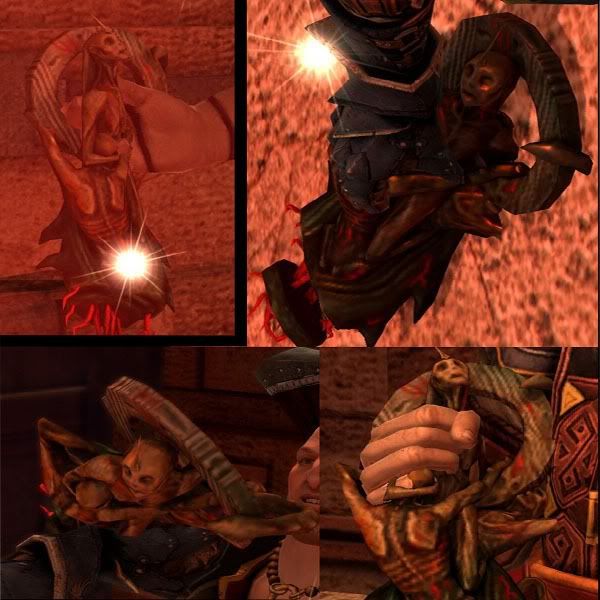
Chapter 2 is really just an introduction into the cultural nuances and conflict with the Qun that are residing in Kirkwall. Also, the conclusion of Chapter 2 is really about the Champion killing the Arishok and the Arishok killing the Viscount which gives the Champion fame and somewhat of a political standing.
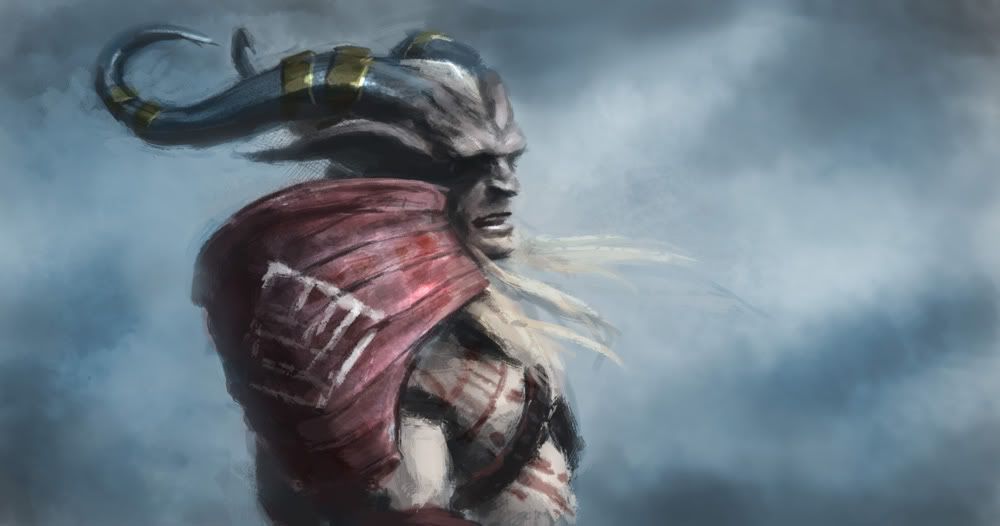
Chapter 3's conclusion is the start of a "civil war" between the already unstable relationship of the Templars and Mages.
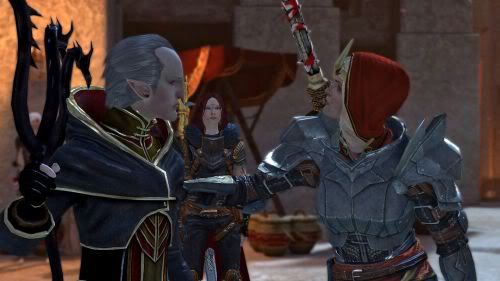
That is Dragon Age II's story "in a nutshell". I'm not trying to belittle the story; I am just trying to give insight on my perspective to how I view it. I can easily over simplify DA: Origins aswell…Blight…get help…choose a new monarch…Archdemon. That is not what this is about.
Dragon Age: Origin's epic is almost Shakespearian in nature. Witches, kings, backstabbery, love lust, and events of the utmost political, ethical, and moral stature are addressed in Origins. Macbeth comes to mind. Your quest in Origins seems objectively paramount and has focus, and is subjectively enthralling at the same time feeling not too linear. The subjectivity of the story was fairly simple to grasp…how far are you willing to go to save this nation of Ferelden? So why did Dragon Age II fall flat? I have heard arguments that DA2 lacked a central villain which, in turn, made it lack a sense of drive and focus. I have also heard that the city of Kirkwall itself was the real antagonist and that political and moral decisions were the "evil characters" in the story. So, Let us get down to business.
Firstly, in Dragon Age II the introduction of your so-called "hero" is an awful display of heroism indeed. The introduction of Hawke is the cowardly act of feeling Loathering when he is obviously powerful enough to kill an ogre at the mere amateur level of 3. Instead of using his powers to help his nation, like the Hero of Ferelden, the Champion flees with no real backstory. In Dragon Age: Origins the game built-up to the ogre encounter and the ogre was a formidable boss fight with three other companions, all of these companions were at the more developed level of 5+, and you had a load of consumables at your disposal. The ogre was by itself in a large room and proved to be a considerably difficult challenge to overcome. In turn, if Hawke can effortlessly destroy an ogre, the preverbal "big dog" of the blight, and simultaneously dispose of additional waves of Dark Spawn with only 2 companions that range from level 2-3, with next-to-no consumables, and a total fighting experience of four prior Dark Spawn encounters. One can assume that Hawke is undoubtedly the superior combatant in comparison to the "Hero of Ferelden" whom sacked the Archdemon Urthemiel and would have unlikely seen victory put in the same situation and circumstances with the ogre. Yet the champion flees. Then why do a much vaster number of people agree that the "Hero of Ferelden" (HoF) was the superior protagonist in comparison to the Champion of Kirkwall? It is because the epic in which the HoF's story takes place is simply a greater tale with a satisfyingly grand closing and the HoF never displayed all of these weaknesses. The Hero of Ferelden met challenges head on. Regardless of whether or not you started in the circle of magi or as a noble dwarf prince your character never seems to flee, without just cause, from the very beginning of your tale. Sure, in some circumstances, your HoF leaves behind their previous life, but the story gave perspective on why. Also, instead of running from the Blight the HoF runs to it.
A point to discuss then is "why would the writer of DA2 start the game there?" with Hawke fleeing and the story leaves their departure ambiguously open. Your character's start is quite literally the foundation of their…well, character. Yes, it is an attention grabber and starts with combat which is a fairly good feature from a storytelling and videogame stand point to begin with. Also I did enjoy the idea of the "story within a story" from Varric, but that could have just as easily been portrayed in a multitude of ways and still delivered an action oriented beginning. Furthermore, I can think of an alternate intro that is just as good, if not better, and that I believe a wide range of fans would have loved to have seen. DA2 hints that you, and or possibly members of your family and for certain Aveline, were at the battle of Ostagar. Since the game talks about this I cannot, for the life of me, understand why DA2 started with you fleeing Loathering and did not begin basically at the same place where DA: O started, Ostagar. There for, intertwining the storylines more intimately and giving a returning audience a deeper connection to their relationship with the narrative. Also, as for the "story within a story" concept, the exaggerated "first Varric version" could have easily been applied with The Champion mutilating entire groups of the Dark Spawn Blight soldiers in single assaults on the battle field of Ostagar. Seriously, who would not have loved the game to start with your character standing side-by-side with King Cailan and Duncan on the battlefield of Ostagar? We could have finally seen Duncan's true demise…or his breath-taking escape from the Battle of Ostagar. Which the scenes of the Battle of Ostagar from DA: O cut short. Even possibly incorporating and revealing the unseen events of Flemeth's successful rescue attempt of the HoF from the bell tower.
THEN, after several close calls with the Blight (Ostagar being one close call then a never formerly told event in Loathering in which the town is actually seen being swarmed and pillaged by the Blight for the first time) Hawke realizing the futility of their struggle decides to save his entire family instead of sacrificing them to the Blight and they depart for Kirkwall. Kirkwall seems like the rational place to go because, according to Hawke's mother, that is where their family once had some hierarchical stature. Thus saving face and initially not looking cowardly.
This different chain of events could have simultaneously worked as a way of introducing Flemeth to DA2 while she saves you from the Battle of Ostagar and revealing her true alternative reason for saving you which she revealed in the actual DA2 storyline. Flemeth's actual motive was the transport of an amulet from "the wilds" to Kirkwall. Wherein, you discover later the amulet housed her non-corporeal form internally. For what motive, she wanted or needed the amulet with her essence inside transported in that manner, Dragon Age II's story never follows-up on and leaves it a mystery.
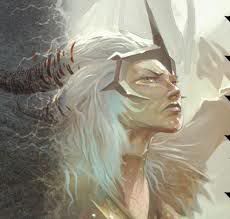
This cheap attention grab, of throwing Flemeth into the game early on and in the demo, was a sorry excuse for trying to push the story forward and to keep DA: O players interested. It is widely known that Morrigan, and her story, is a fan favorite of the DA: Origins' tale and that everyone is salivating for a taste of its conclusion. So, to throw Flemeth in the story and to imply follow-through with some of Flemeth/Morrigan's story, but not deliver…at all, was a huge disappointment. When you are on the summit, where Flemeth wanted the amulet delivered, and Flemeth returns to her corporeal form and you ask her "why did you want me to bring this here?" Flemeth's reply is basically "I'm out… (Turns into dragon and flies away)" you can't help but feel cheated when the story does not answer the question, your own character just asked, within the same videogame. This would have been fine if it was addressed in the same game, but since it didn't, in retrospect, it just feels like they're setting up for another game's story and not trying to deliver the full potential of this game's fable.
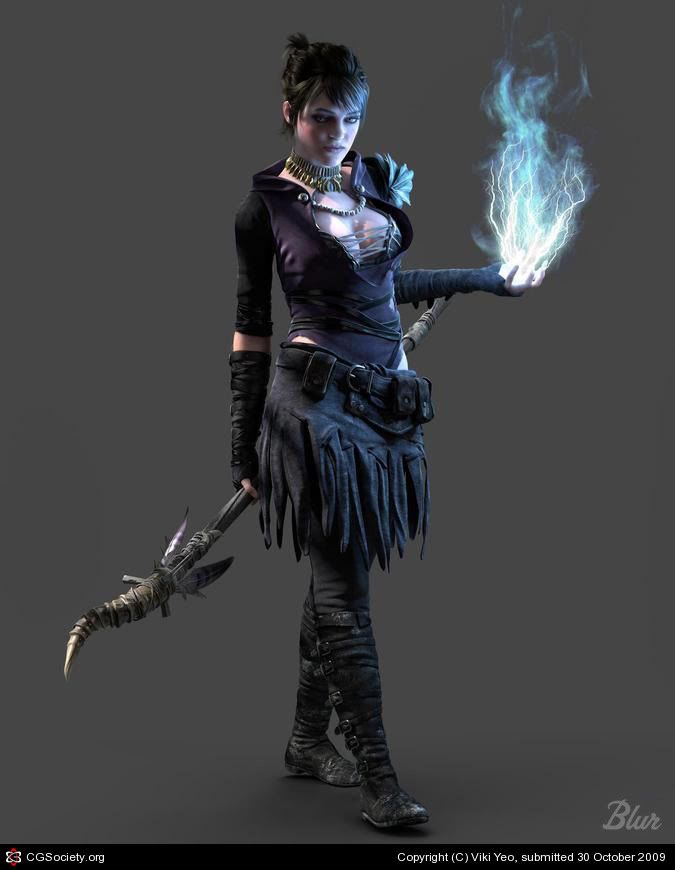
Many aspects of the story felt like they were only thrown in for the reasons of "setting-up" events for another installment of the franchise. For example, one set-up is the conclusion to the game's final segment. Also known as the Circle of Magi, Templar feud. Even the conclusion of Chapter 2 felt as though the story is just setting-up for something else with the Arishok's last words being "One day…we shall return". If the Qun would have returned in DA2 it wouldn't have felt like it was just framework for something else. But, the Qunari never returned. The bulk of the story felt as though it was only setting-up all of the conditions for a chronicling of epic proportions instead of delivering them in the story at hand.
The way the first chapter's conclusion is pathetically attempted to be validated as an important plot point by adding the Dwarven Artifact to Meredith's sword hilt was pitiful. The first chapter's conclusion really had almost no significance. The Dwarven artifact was absent from the end of Chapter 1 until the last boss encounter of the game. The story could have had the exact same chain of events without their lame attempt to include the Lyrium Idol onto Meredith's sword. In reality the only real importance of the entire first chapter was the exodus from Loathering and gaining some social standing. Because of the way the story feebly ratifies the first chapter's importance it makes the entire first chapter feel meaningless. Also, if the only real goal of the first chapter was to gain your family estate you could have easily done that by subtracting chapter 1's conclusion for chapter 2's ending, with the Champion defending Kirkwall and besting the Arishok.
Since the Qunari's response to the death of the Arishok was never felt and the absence of the impending war between the Templars and Mages never came to fruition I don't see how they could be okay with the story ending where it did. The story could have easily merged the conclusions of all three chapters into a single chapter. The story could have had the Champion find their wealth, the Arishok's death, and the straws that broke the camel's back to ignite the true conflict between the Mages and Templars in a single interval. I will get to my concept for this outcome in a moment.
This is why the story feels so obfuscated. What was the true meaning and important theme here? Yes, it is a good thing to have an ambiguous ending which begs the audience to draw their own outcome from the possibility of multiple interpretations, but the audience's options to choose upon important plot points should not be so construed. What is the story's actual axiom? Is the axiom the Ancient Dwarven artifacts that are Lyrium Idols and their influences on the sentient mind? Is it the corruption of Kirkwall's citizen's way of life and or the way a foreign dignitary can be affected by an "alien" culture to such a magnitude as to call upon confrontation? Finally, is the story about the moral and ethical pressures in the delicate world of a special type of "indentured servants" known as Mages and the overseers of said servants, known as Templars, who are supposed to be the "checks" in the balance between the two? The truth is that the story has no axiom or self-evident morality lesson. The story is obfuscated and the ambiguity of multiple interpretations is not within the realm of rational. Also, if you say "the story is, well…about all of those things" then you cannot deny that DA2's story is just the intermediary for setting the key players up for a different tale because of the way the narrative does not respond to any of these questions the protagonist(the audience, you) asks. Furthermore, if you claim that the city of Kirkwall is the real antagonist it is irrelevant because the story still never concludes any of the situations that are introduced with any amount of finality. Again, will the Qunari be back with a formidable force? What is going to happen in Kirkwall with the conflict between the Chantry, Templars, and Mages? Does the Dwarven artifact's manipulation of sentient life forms have significance to the plot? What the heck happened to Flemeth and Morrigan? Why not answer some of these questions in the same body of work if the objective of the narrative was not solely to set the stage for another game?
Here is a concept for what should have happened. Hawke should have risen to a respectable level of political power from defending Kirkwall from the Arishok and the tension of the Templar/Mage conflict should have ignited in a single chapter. This would have left the rest of the story open to finish up the quarrel between the Mages and Templars and or the gathering of funds and troops for the impending Qunari invasion to defend your new homeland. Which your character had failed to do once before in Loathering and wouldn't see it happen again in the case of Kirkwall, the Champion's new home. I am sure that some of these uncertainties will be answered…not until the next game though. Until this happens you cannot refute that you have only gotten a sample of the Champion's story. The tale of the Champion, in comparison to the epic of the Hero of Ferelden, only felt as though you got a small amount and what you have seen so far is nowhere near the Champion's start-to-finish history like HoF's story was. I don't know about you, but I feel cheated. Yes, it is fine to have a hero born in battle and circumstance, tell their tale, then have a continuation of their legends after words, but this story never finishes on ANY of the real predicaments awakened in it.
The equivalent of this would be like opening up a book and only getting the first couple of chapters read then the rest of the pages are blank. I would be very unhappy with that situation if I just paid 60$ for my brand-new book.
Dragon Age: Origins did not suffer from any of these shortcomings. Even if the tale of the Hero of Ferelden is looked at in the same simple way I stated it earlier " Blight, get help, new monarch, Archdemon" one can still tell that nearly all of the issues awakened in the story were addressed with finality. I will breakdown the story in the same manner as I broke down DA2. Chapter 1 would be the birth of a Grey Warden and the fall of a king because of the treason of Loghain. Chapter 2 would be the newly awakened urgency of the need to gather a formidable force to battle the Blight. Chapter 2's conclusion would be the gathering of said armies. Lastly, chapter 3 is about the rise of a new king and to conquer your opposing enemy king…the Archdemon. The first part of the story introduced the antagonists and by the end of the story all of them had been dealt with in one way or another, including Loghain. The only question the game did not address was if Morrigan was a friend to the HoF throughout or actually a brilliant antagonist the entire time who took the motto of "keep your friends close, but keep you enemies closer" to scary level of dedication. Why did she want that baby inside her to have the essence of the Archdemon's soul? What is her endgame? Was she actually manipulating you the entire time or were her motives righteous? This unanswered question was fine because it was an excellent plot twist and was only brought about moments before your ascent into the final battle. This question left the "door" open for possible sequels and remained to be one of the story's most intelligently ambiguous occurrences.
All in all, in the case of Dragon Age one very important part of "What can save a story?" seems to be follow-through.
I am not saying that Dragon Age II is bad writing, I am saying the story felt like it was all prologue.
Leave your ideas as to what can save a story. Make or break it. What game do you think had the best story in a video game? Also, leave any suggestions to what you think could have enhanced your Dragon Age story experience and or did you think it was perfect the way it was?
Stay tuned for my "future" Dragon Age plot idea.
